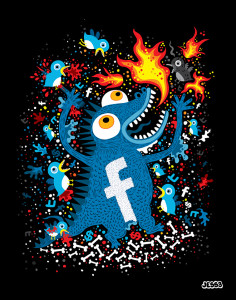

TUESDAY, June 11 (HealthDay News) — All those “status updates” and “tweets” that people post as they clamor to be part of the online social network may reflect a troubling trend toward self-absorbed behavior in the United States, a new study suggests.
The University of Michigan researchers examined whether narcissism was related to the number of daily Facebook and Twitter postings by 486 college students and 93 adults, and to the amount of time they spent on each site.
The college students’ average age was 19, and three-quarters were women. The average age of the adults was 35, and most of them were white women.
“Among young adult college students, we found that those who scored higher in certain types of narcissism posted more often on Twitter,” study author Elliot Panek, who recently completed his doctorate in communication studies, said in a university news release. “But among middle-aged adults from the general population, narcissists posted more frequent status updates on Facebook.”
Facebook functions as a mirror for narcissistic adults, Panek explained.
“It’s about curating your own image, how you are seen, and also checking on how others respond to this image,” he explained. “Middle-aged adults usually have already formed their social selves, and they use social media to gain approval from those who are already in their social circles.”
Twitter is the social media tool of choice for narcissistic college students.
“Young people may overevaluate the importance of their own opinions,” Panek said. “Through Twitter, they’re trying to broaden their social circles and broadcast their views about a wide range of topics and issues.”
The findings, published online June 11 in the journal Computers in Human Behavior, suggest that narcissistic college students and adults use social media in different ways to inflate their egos and control other people’s perceptions of them, according to Panek.
He and his colleagues weren’t able to determine whether narcissism leads to increased use of social media, whether social media use leads to narcissism, or whether other factors explain the association.
More information
The American Psychological Association has more about narcissism.

